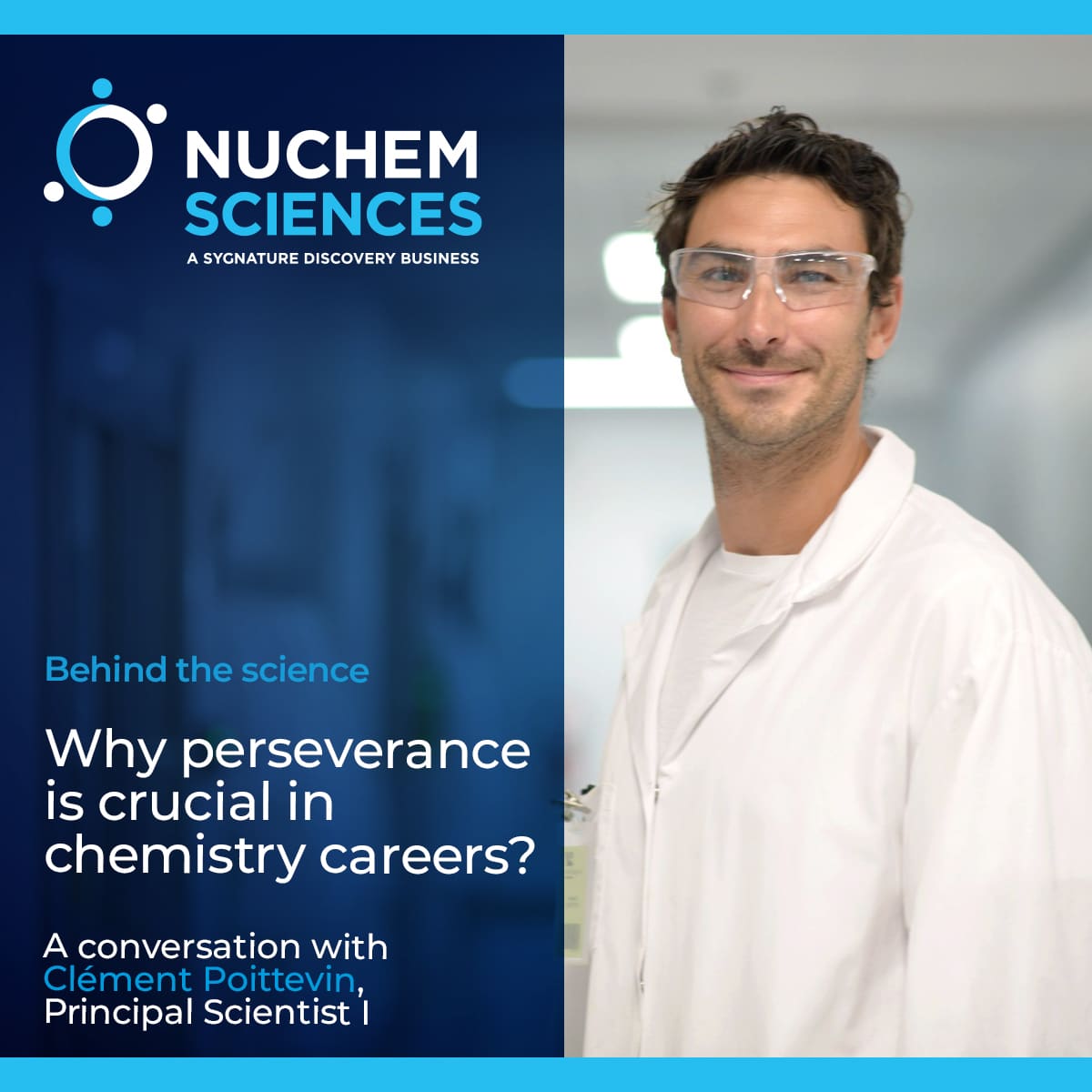Why perseverance is crucial in chemistry careers?
A conversation with Clément Poittevin, Senior Scientist I
Clément Poittevin, a Senior Scientist I at OmegaChem, discovered his passion for organic chemistry during his days as a student and a lab trainee in France.
This love for chemistry encouraged him to seek exciting opportunities in Canada and got him through more difficult days in the lab.
In our latest interview, Clément tells us about the need for perseverance and teamwork in the face of chemistry challenges, as well as the importance of having a passion for your work.

How did you get your start in drug discovery and chemistry?
I got my start when I earned a diploma in chemistry from the Grenoble Institute of Technology. I deliberated between specializing in water testing or organic chemistry, so I took up traineeships in analysis laboratories. And following these internships, I also worked in these laboratories as a technician during the summer months, which enabled me to put my training into practice.
After that experience, I realized that I was more interested in organic chemistry. I continued my studies at Joseph Fourier University (now known as Grenoble I) and earned a bachelor’s degree and master’s degree in organic chemistry. While there, I did two traineeships with Professor Jean-Francois Poisson, who is part of the chemistry department at the university. It was there that I discovered that I really loved research and I started building a career in that area.
I worked toward a Ph.D. at the University of Bordeaux and focused on free-radical multicomponent chemistry with the Professor Yannick Landais.
After completing my Ph.D., one of my former colleagues at the University of Bordeaux put me in contact with Professor Pierre Deslongchamps at Université Laval in Canada. Professor Deslongchamps is very well known in Canada and is one of the biggest names in chemistry. So, I applied to be a postdoctoral researcher at Université Laval and studied the theory of bent bonds with the aim of better understanding the chemical reactivity of radicals.
My connection to OmegaChem started with Professor Deslongchamps. He worked in close collaboration with the company and suggested that it might be a good idea for me to work in the private sector. I was curious about what it would be like to work outside academia, especially as it can be difficult to find that kind of work in France. I was also interested in doing research that was more applied rather than working with pure theory.
So, I’ve been working for OmegaChem for seven years and have been living in Quebec for eight years.
You mentioned the difficulty in finding a job like this in France. Do you think it’s easier to work in Quebec?
Ultimately, I came to Canada because I wanted to travel and learn more about the world. However, it’s true that private sector companies in Quebec are more active in seeking employees than companies in France.
In France, there are a lot of highly qualified scientists in chemistry who have post-doctorate degrees. However, they still struggle to find good work in private companies. Often, these companies only offer short-term contracts that last a maximum of one or two years. So, it’s definitely easier to find a better job in Quebec.
What is your specialty at OmegaChem?
My title is Senior Scientist I and I work in the medicinal chemistry team. I am involved in the synthesis of small quantities for the first biology tests, and we send those quantities to our clients.
Generally, our clients request a synthesis of a molecule they are interested in, and we do all the research to synthesize that molecule and send it to them. We normally synthesize between 10 and 20 milligrams, as our clients generally don’t need large amounts at that stage of testing. We also work on other projects in addition to synthesis, and we often need to move quickly. Sometimes, we might have to run reactions on bigger quantities, purify them and then advance those products.
What is a typical day for you?
On a typical day, I arrive at work and analyze the reactions I started the night before. Based on the results of those reactions, I decide to start other reactions. Then I treat my reactions and purify them.
We prepare reports for our clients weekly or biweekly depending on their needs. When that happens, I review my team’s report and edit it. Then, I send the report to my boss, and he shares it with the client. Although I have a little more responsibility in that sense, I still consider myself to be part of the team with the rest of my colleagues. Teamwork is hugely important to me.
When a customer asks us for a new molecule, I first establish the optimum synthesis route and look at the availability of the starting materials needed for this synthesis. We then share that synthesis pathway with the clients and talk about the options available.
Most of the time, the client our team works for gives us carte blanche to propose other ideas and to troubleshoot any issues we have. It’s important that clients have confidence in us, and our clients do. Sometimes, they even send us reports from other CROs they work with where a result didn’t work. In that case, we troubleshoot it and send them a new protocol. In short, we deliver the products they need and, if needed, offer a bit of consulting.
How would you define yourself?
I would say that I’m a very detail-oriented person and I am focused on finding solutions. I’m also quite resilient. Even if a reaction doesn’t work, it can still give us lots of data that can inform our next reaction. Chemistry doesn’t always work out the way we expect all the time, but I persevere.
What initially attracted you to working for OmegaChem?
I was already in Quebec. I felt good about being here and didn’t want to move elsewhere. Quebec is very close to nature, and there are lots of opportunities for rock-climbing, kayaking and much more. I would prefer to be here, in Quebec City, than living in a bigger and more urban city.
OmegaChem is also growing enormously. When I first started working here, I saw all the construction for several new labs and that inspired me. As the CRO market continues to expand, pharma companies will need us more. We are growing in response to the number of companies who require our services.
You also won an award for your work. Tell us about that!
Yes, I won a prize for innovation at OmegaChem in September 2020! They give out this prize once a year and I received it in recognition of my work and contribution to total synthesis for a client. That client was keenly awaiting that product, and they would write to us every day to find out what was going on! So, I suggested a new approach that gave a successful result.
Do you have a personal mantra?
You must love what you do. I am very fortunate to have a career I really love. Of course, I will continue to evolve within my career by going into management. However, I take a lot of pleasure in my work right now. It’s important to have this attitude, because sometimes things don’t work out some days and we need to remind ourselves why we enjoy our work.
What advice would you give a young person in chemistry?
I would tell them to do what they love. I would also advise them to persevere. The world of chemistry can be challenging and involves a lot of work and time. However, patience and perseverance make it a rewarding career. It’s our passion for chemistry that inspires us to work so hard and for such a long time. If they like applied research, I would also recommend working in the private sector.
And of course, they should believe in themselves!

Transform Ideas Through Science
A drug discovery and chemical development contract research organization.
News & Events
NuChem Sciences Inc.
2350 Rue Cohen Suite 201
Saint-Laurent, Quebec
Canada H4R 2N6
514 416 5659
